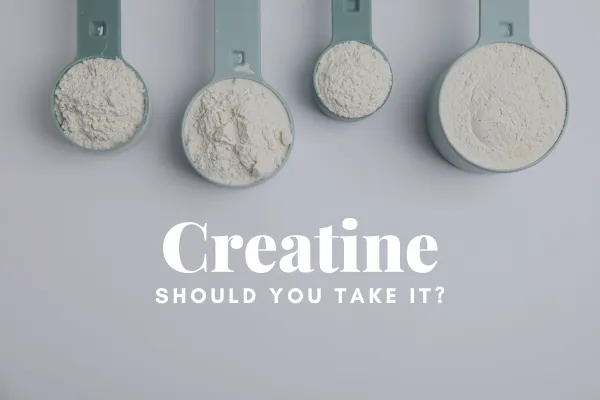
Creatine for Women in Menopause: What You Need to Know Before You Start
When most women hear the word creatine, they think of bodybuilders, bulk, or something “only for men.”
But here’s what the latest research (and my own coaching experience) shows:
Creatine is one of the most effective, safest, and underused tools for women over 40 (especially during menopause.)
And if your goal is to build muscle, protect your bones, improve brain fog, and feel strong again, creatine can help.
But hold on—before you start dumping scoops into your shaker, there’s something critical we need to talk about first: If your gut health is off, creatine might not work the way you want it to.
Let’s break it all down.
Why Building Muscle Is Non-Negotiable in Menopause
Muscle isn’t just about vanity or aesthetics—it’s our #1 anti-aging insurance.
After 40, women naturally start to lose muscle mass due to shifting hormones. This process accelerates during menopause thanks to the drop in estrogen and testosterone.
What does that mean for you?
Slower metabolism
More belly fat (especially visceral fat)
Increased risk of osteoporosis and fractures
Weakness, fatigue, and loss of independence
Here’s the fix: resistance training + proper nutrition + targeted supplements.
This is where creatine comes in.
What Is Creatine (and Why Should You Care)?
Creatine is a naturally occurring compound made from amino acids. It helps your cells produce ATP—your body’s main energy source—especially during intense activity like lifting weights.
Women have 70–80% lower creatine stores than men.
That’s a huge gap. Especially considering:
Women lose muscle faster post-menopause
Creatine supports brain function, energy, and mood
Low creatine levels may contribute to menopausal symptoms like fatigue and brain fog
Adding 3–5 grams of creatine monohydrate per day can:
✅ Increase muscle strength and lean mass
✅ Boost brain energy and mental clarity
✅ Support bone density when combined with lifting
✅ Reduce post-exercise fatigue and support recovery
The Gut-Creatine Connection: Why It Matters
Here’s what most people (even some coaches) miss:
👉 If your gut health is compromised, your body may not absorb or utilize creatine properly.
Women in menopause often deal with gut-related issues—bloating, inflammation, leaky gut, or poor nutrient absorption. And that matters because:
Inflammation can blunt creatine uptake
Digestive issues can make symptoms like water retention or bloating feel worse
An inflamed gut can compromise how well your muscles respond to training and supplementation
So before you start creatine, you need a foundation:
Address gut inflammation
Minimize processed foods and alcohol
Prioritize fiber, fermented foods, and gut-healing nutrients
Support digestion
Digestive enzymes, magnesium, and hydration matter
Eat enough protein
Creatine is most effective when your protein intake supports muscle repair
What to Know Before Taking Creatine
If you’ve never taken creatine before, here’s what to expect:
👉 You might bloat… initially.
This is intracellular water retention (in the muscle), not fat. It’s temporary and usually subsides within a few weeks. Stay hydrated.
👉 You don’t need to “load.”
Skip the high-dose loading phase unless directed by a practitioner. 5g/day is enough for most women.
👉 Not all creatine is created equal.
Stick with creatine monohydrate—it’s the most researched and best-absorbed form. Choose a third-party tested supplement with no fillers.
👉 Consistency wins.
Creatine isn’t a quick fix. It works when taken daily, even on rest days, as part of a full training and recovery plan.
When to Take Creatine
You can take it:
Pre-workout
Post-workout
Mixed into your smoothie or water
As long as you take it consistently, timing doesn’t matter as much.
How Creatine Supports the Menopausal Body
🔥 Muscle Growth
Supports strength gains and preserves lean tissue during hormonal shifts.
🧠 Cognitive Function
May reduce brain fog, improve mood, and protect against age-related decline.
🦴 Bone Density
When combined with resistance training, creatine helps support bone strength.
💪 Recovery & Energy
Improves ATP regeneration so you recover faster and train harder without feeling drained.
Final Thoughts
Creatine isn’t just a “gym bro” supplement.
It’s one of the most powerful tools we have to fight back against muscle loss, fatigue, mood swings, and the metabolic slowdown that comes with menopause.
But remember—creatine can’t do the work for you.
It’s a bonus, not a replacement.
If your gut health is on point, your training is structured, and you’re consistent…
Creatine might just be the secret weapon your midlife body’s been waiting for.
Ready to Add Creatine to Your Routine?
I’ve created a list of the top supplements I recommend for women over 40.
🧬 Click here to get the full list and start optimizing your stack.
Because building your Strong & Sexy body doesn’t start with motivation.
It starts with muscle—and smart supplementation.
